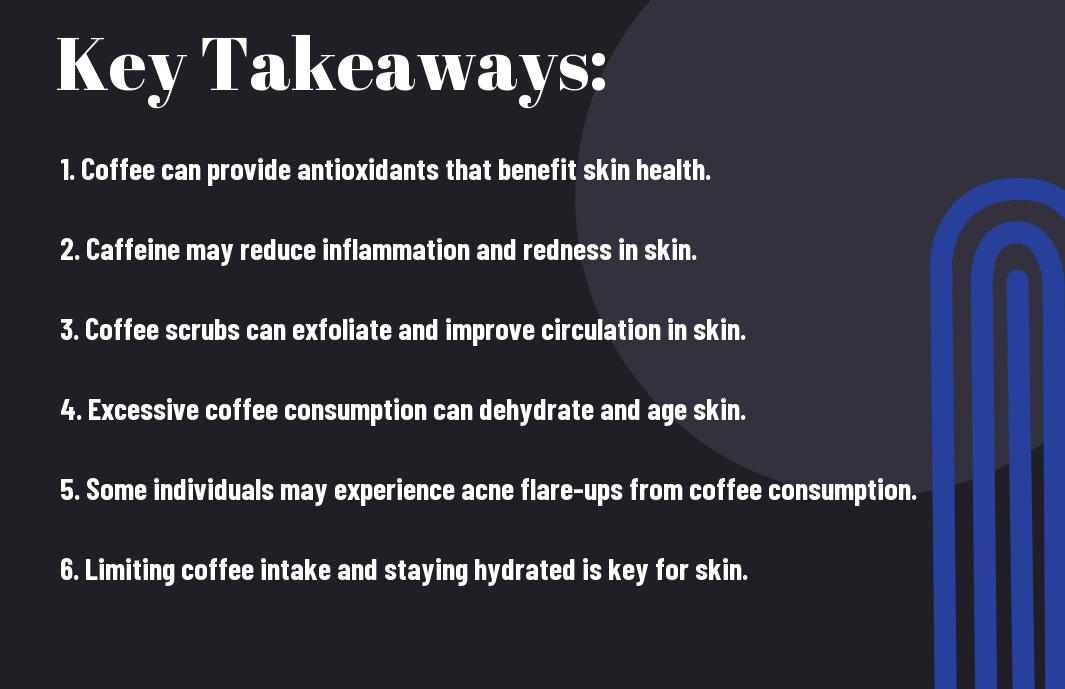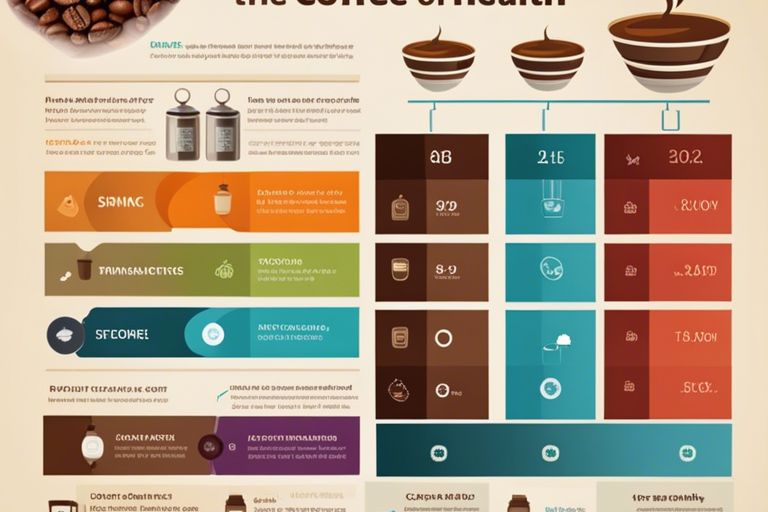Most coffee lovers are curious about the effects of their favorite brew on their skin. Coffee is a popular beverage known for its stimulating properties, but how does it really impact our skin health? In this article, we investigate the details of how your daily coffee fix can affect your skin’s appearance and overall health. For more information on the effects of coffee on your skin, check out The Effects Coffee Can Have on Your Skin, According to Byrdie.
Key Takeaways:
- Antioxidants in coffee: Coffee contains antioxidants which can help protect your skin from damage caused by free radicals.
- Caffeine benefits: Caffeine in coffee can help reduce inflammation and redness in the skin, making it a good ingredient for skincare products.
- Hydration: Drinking coffee in moderation can contribute to your daily fluid intake, which is important for keeping your skin hydrated and healthy.
The Science Behind Coffee and Skin
To understand how coffee affects your skin, it’s vital to probe into the science behind the interactions between coffee compounds and skin health. Two key components in coffee, caffeine, and antioxidants, play significant roles in determining the impact on your skin.
Caffeine’s Impact on Blood Flow
Coffee, with its high caffeine content, can have a stimulating effect on blood flow when consumed or applied topically. Caffeine is known to constrict blood vessels, reducing inflammation and puffiness in the skin. This constriction can also temporarily improve circulation, giving your skin a more vibrant and awake appearance.
Antioxidants and Their Role in Skin Health
On the other hand, antioxidants found in coffee can provide numerous benefits for skin health. These powerful compounds help combat free radicals, which are unstable molecules that can damage skin cells and accelerate aging. By neutralizing free radicals, antioxidants in coffee can help protect your skin from premature aging and keep it looking youthful and radiant.
In addition to their protective effects, antioxidants in coffee also have anti-inflammatory properties that can soothe irritated skin and reduce redness. Incorporating coffee-infused skincare products or enjoying a cup of antioxidant-rich coffee can be a great way to promote overall skin health and radiance.

The Positive Effects of Coffee on Skin
Improving Circulation and Reducing Inflammation
Now, let’s examine the positive effects of coffee on your skin. Any coffee lover knows the feeling of a warm cup of joe waking up not just your mind but your entire body. The caffeine in coffee is a natural stimulant that can improve blood circulation when applied topically to the skin. This increased blood flow can help reduce inflammation and puffiness, giving your skin a more refreshed and rejuvenated appearance.
Boosting Collagen Production and Skin Elasticity
Skin elasticity is crucial for maintaining a youthful appearance and preventing the formation of fine lines and wrinkles. Coffee contains antioxidants that can help boost collagen production in the skin, leading to improved elasticity. Skin that is more elastic is able to bounce back from environmental stressors and maintain a smoother, firmer texture over time.
Additionally, the caffeine in coffee can also help protect the skin against UV damage, which can contribute to premature aging. By incorporating coffee-based skincare products into your routine, you can help protect your skin from the harmful effects of sun exposure while promoting collagen production for a more youthful complexion.
Circulation
Now, you can see why incorporating coffee into your skincare routine can have such positive effects on your skin. From improving circulation and reducing inflammation to boosting collagen production and skin elasticity, coffee can be a valuable addition to your skincare arsenal.

The Negative Effects of Coffee on Skin
Dehydration and Dryness
For some people, coffee can lead to dehydration, which can have negative effects on the skin. When the body is dehydrated, skin can become dry, flaky, and less supple. Coffee is a diuretic, meaning it can increase urine production and lead to a loss of fluids in the body. To combat this, it’s important to drink plenty of water throughout the day to stay hydrated and help maintain healthy skin.
Increased Stress Hormones and Acne
Any fluctuations in stress hormones can also impact the skin. Consuming too much coffee can trigger the body to release stress hormones like cortisol, which can lead to increased oil production in the skin. This excess oil can clog pores and result in acne breakouts.
To further exacerbate the issue, the dairy or sugar often added to coffee can also contribute to acne formation. High sugar intake is linked to inflammation in the body, which can manifest as acne on the skin. To mitigate these effects, consider opting for black coffee or alternative milk options to minimize the impact on your skin.
It is important to maintain a balanced approach when consuming coffee to avoid these negative effects on the skin. Being mindful of your intake and staying hydrated can help mitigate any potential issues and keep your skin looking healthy and radiant.
Caffeine’s Impact on Skin Conditions
Many studies have shown that caffeine can have both positive and negative effects on various skin conditions. Understanding how caffeine affects common skin conditions like rosacea, eczema, psoriasis, and others can help individuals make informed decisions about their coffee consumption and skincare routines.
Caffeine’s Impact on Rosacea and Eczema
Any excessive consumption of caffeine, including from coffee, has been linked to worsening symptoms of rosacea and eczema. Caffeine is known to dilate blood vessels, which can exacerbate the redness and flushing associated with rosacea. Additionally, caffeine can dehydrate the skin, leading to increased sensitivity and irritation for individuals with eczema.
Coffee’s Effects on Psoriasis and Other Skin Conditions
Effects of coffee on psoriasis and other skin conditions are varied. While some studies suggest that caffeine can reduce inflammation and improve symptoms of psoriasis, others indicate that it may trigger flare-ups in certain individuals. Furthermore, excessive caffeine intake can disrupt sleep patterns, stress levels, and hormonal balance, all of which can contribute to skin issues.
Eczema is another skin condition that can be affected by coffee consumption. While caffeine itself may not directly cause eczema, it can worsen existing symptoms due to its dehydrating effects on the skin. Individuals with eczema should monitor their coffee intake and consider alternatives to support healthier skin.

The Role of Additives in Coffee and Skin
After enjoying your morning cup of coffee, you may wonder about the impact of additives like sugar and cream on your skin. These common accompaniments can play a role in skin health, so let’s research into how they might affect your complexion.
Sugar, Cream, and Skin Inflammation
One concern with adding sugar and cream to your coffee is their potential to trigger skin inflammation. Consuming excess sugar can lead to a process called glycation, where sugar molecules attach to proteins in the skin, resulting in the formation of advanced glycation end products (AGEs). AGEs can contribute to skin aging, leading to wrinkles and loss of elasticity. Cream, especially heavy cream or those with additives, could also potentially exacerbate inflammation in the body, which may manifest in the skin.
Artificial Sweeteners and Skin Health
One popular option for those looking to sweeten their coffee without added calories is artificial sweeteners. While these alternatives can help with weight management, their impact on skin health is less understood. Some studies suggest that certain artificial sweeteners, like aspartame or saccharin, might trigger inflammation in the body, which could potentially affect skin health. More research is needed to fully understand how these additives might influence skin conditions like acne or aging.
Skin can serve as a reflection of our overall health, and the choices we make in our diet, including what we add to our coffee, can play a role in its appearance. Being mindful of the additives we incorporate into our daily brew can have implications beyond just the taste of our morning pick-me-up. So, next time you reach for your coffee sweetener, consider how it might be influencing not just your taste buds, but also your skin.
Lifestyle Factors and Coffee’s Impact on Skin
Your lifestyle choices can significantly impact how coffee affects your skin. Factors such as sleep deprivation and exercise play a crucial role in determining the overall effects of coffee on your skin’s health and appearance. Understanding how these lifestyle factors interact with coffee consumption can help you make informed decisions about your daily habits.
Sleep Deprivation and Coffee Consumption
With our hectic schedules and busy lives, many of us turn to coffee to help us stay awake and alert. However, consistently relying on coffee to combat sleep deprivation can have detrimental effects on your skin. Lack of sleep leads to increased cortisol levels, which can trigger inflammation and break down collagen in the skin, leading to premature aging. Additionally, the diuretic effect of caffeine can dehydrate the skin, making it appear dull and dry.
This study highlights the importance of balancing coffee consumption with adequate sleep to maintain healthy skin and prevent premature aging.
Exercise and Coffee’s Effects on Skin
With regular exercise being a key component of a healthy lifestyle, many individuals choose to have a cup of coffee before their workout for an extra energy boost. While moderate coffee consumption can enhance physical performance and endurance, excessive intake can lead to dehydration, which in turn can affect the skin’s overall health.
Lifestyle choices such as incorporating a cooling-off period post-exercise and staying hydrated can help mitigate the dehydrating effects of coffee and maintain skin health. It’s important to strike a balance between coffee consumption, exercise, and skincare routines to ensure that your skin remains radiant and healthy.
Summing up
Taking this into account, it is clear that coffee can have both positive and negative effects on the skin. While the antioxidants in coffee can help protect against UV radiation and promote healthy skin, excessive consumption or direct contact with coffee grounds can lead to dehydration and irritation. It is important to be mindful of how much coffee you are consuming and how you are using it as part of your skincare routine in order to achieve the best results for your skin.
FAQ
Q: Does coffee have any impact on my skin?
A: Yes, coffee can affect your skin in various ways. It has both positive and negative effects depending on how it is consumed and used.
Q: Can drinking coffee cause skin issues?
A: Excessive coffee consumption can lead to dehydration, which can make your skin look dull and dry. It can also exacerbate existing skin conditions like acne and eczema.
Q: How does caffeine benefit the skin?
A: Topical application of caffeine can help reduce inflammation, puffiness, and redness in the skin. It can also promote blood circulation, which can give your skin a more youthful appearance.
Q: Does coffee have antioxidant properties that benefit the skin?
A: Yes, coffee is rich in antioxidants that can help protect the skin from free radical damage caused by environmental factors like pollution and UV radiation.
Q: Can coffee help with cellulite reduction?
A: Some studies suggest that caffeine in coffee can help reduce the appearance of cellulite by improving blood flow to the affected areas and breaking down fat cells. However, results may vary for individuals.
What are the best coffee regions in the world








